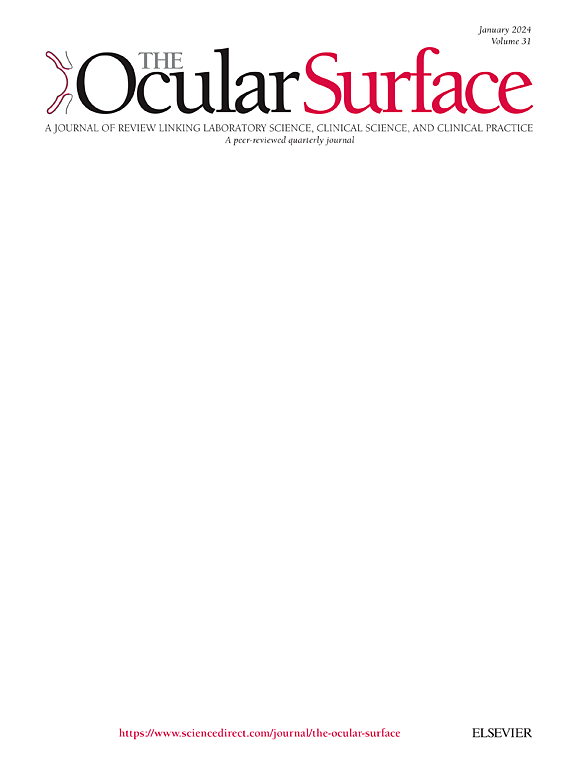The association between personality and dry eye disease: A large cross-sectional study
IF 5.6
1区 医学
Q1 OPHTHALMOLOGY
引用次数: 0
Abstract
Purpose
Personality influences health and wellbeing. The purpose of this large, cross-sectional study was to clarify the association between personality traits and dry eye disease (DED).
Methods
78,610 participants from the Lifelines cohort were included. DED was assessed using the Women's Health Study (WHS) dry eye disease questionnaire. Three of the Big Five personality domains (neuroticism, extraversion, conscientiousness) were assessed using an abbreviated NEO Personality Inventory. Logistic regressions including age, sex, BMI, physical activity, smoking, education, income, and 48 medical comorbidities were used to examine the association between personality and DED. The main outcome was WHS-defined DED, with highly symptomatic DED as a secondary outcome. Results are presented as odds ratios per standard deviation increase in personality score.
Results
DED was present in 8.7 % of participants. In the fully corrected model including all demographics and comorbidities, higher neuroticism was associated with greater odds of DED (OR 1.10, P < 0.001), while higher conscientiousness was tied to lower odds of DED (OR 0.97, P = 0.014). For highly symptomatic DED, these associations were especially strong: OR 1.23 (P < 0.001) and 0.90 (P < 0.001) for neuroticism and conscientiousness, respectively. Higher extraversion was associated with lower odds of highly symptomatic DED (OR 0.93, P = 0.031), but showed no significant relationship with WHS-defined DED. Additionally, participants diagnosed with DED who had higher neuroticism scores experienced a greater symptom burden.
Conclusions
Higher neuroticism and lower conscientiousness are associated with increased odds of DED. These personality traits may contribute to increased subjective symptoms and are important to consider in clinical management and care.
个性与干眼病之间的关系:一项大型横断面研究
个性影响健康和幸福。这项大型横断面研究的目的是澄清人格特质与干眼病(DED)之间的关系。方法纳入78,610名来自生命线队列的参与者。DED采用妇女健康研究(WHS)干眼病问卷进行评估。五大人格领域中的三个(神经质、外向性、尽责性)是用一个简短的NEO人格量表来评估的。Logistic回归包括年龄、性别、BMI、体力活动、吸烟、教育程度、收入和48种医学合并症来检验人格与DED之间的关系。主要结局是whs定义的DED,高度症状性DED是次要结局。结果显示为人格得分每标准差增加的比值比。结果8.7%的参与者存在ded。在包括所有人口统计学和合并症在内的完全校正模型中,神经质程度越高,DED的几率越大(OR 1.10, P <;0.001),而较高的责任心与较低的DED几率相关(OR 0.97, P = 0.014)。对于高度症状性DED,这些相关性尤其强:OR为1.23 (P <;0.001)和0.90 (P <;对于神经质和尽责性,分别为0.001)。较高的外向性与较低的高症状性DED发生率相关(OR 0.93, P = 0.031),但与whs定义的DED无显著关系。此外,被诊断为DED的参与者神经质得分较高,症状负担更大。结论较高的神经质和较低的责任心与DED的发生率增高有关。这些人格特征可能导致主观症状的增加,在临床管理和护理中需要考虑。
本文章由计算机程序翻译,如有差异,请以英文原文为准。
求助全文
约1分钟内获得全文
求助全文
来源期刊

Ocular Surface
医学-眼科学
CiteScore
11.60
自引率
14.10%
发文量
97
审稿时长
39 days
期刊介绍:
The Ocular Surface, a quarterly, a peer-reviewed journal, is an authoritative resource that integrates and interprets major findings in diverse fields related to the ocular surface, including ophthalmology, optometry, genetics, molecular biology, pharmacology, immunology, infectious disease, and epidemiology. Its critical review articles cover the most current knowledge on medical and surgical management of ocular surface pathology, new understandings of ocular surface physiology, the meaning of recent discoveries on how the ocular surface responds to injury and disease, and updates on drug and device development. The journal also publishes select original research reports and articles describing cutting-edge techniques and technology in the field.
Benefits to authors
We also provide many author benefits, such as free PDFs, a liberal copyright policy, special discounts on Elsevier publications and much more. Please click here for more information on our author services.
Please see our Guide for Authors for information on article submission. If you require any further information or help, please visit our Support Center
 求助内容:
求助内容: 应助结果提醒方式:
应助结果提醒方式:


